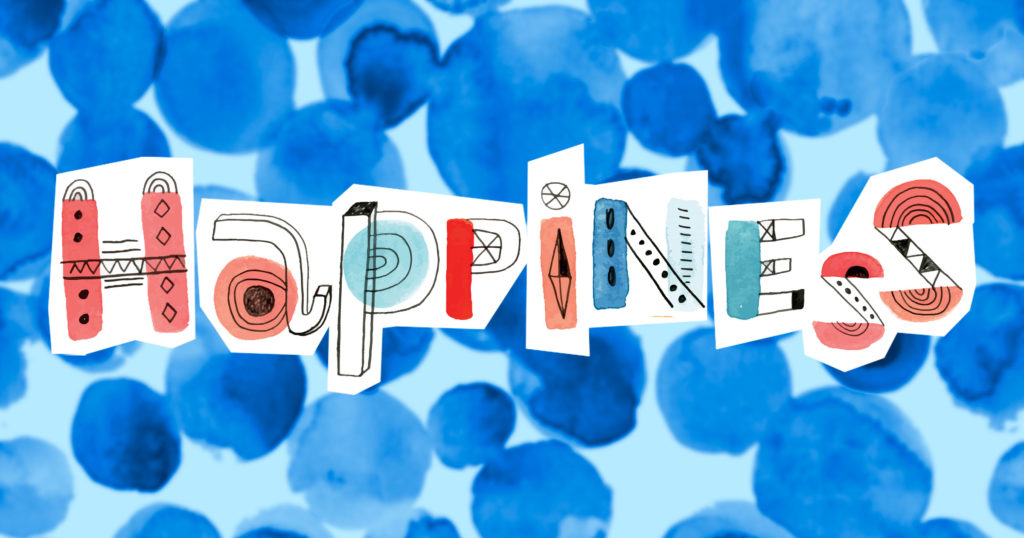Why We Struggle with Happiness

From Caroline’s 2012 Salon – Part 1 of 4
Small workshops are wonderful for several reasons, the main one being that they give me the opportunity to have more in-depth conversations with people about the subject matter I’m teaching. In a workshop a few years ago a woman noted that, “being happy is just so difficult these days.”
It wasn’t as if I hadn’t heard similar comments through the years, and many of them. But something about the way she said that made me stop for a moment. Maybe it was because I had noticed three magazines at the airport en route to this venue that featured articles on how to find happiness, steps to take that guaranteed you would be happy, and how to figure out why you weren’t happy. I have to admit that as I reviewed those magazines covers, my initial response was, “How typically American these days. I mean, really?”
I leaned back on a table and asked this woman, “What do you need to make you happy? What are the life ingredients you require?”
This woman, well into her forties, drew a blank. She actually had no idea what she required or what she wanted or what she associated with happiness. All she knew was that she was not happy. I asked, “Do you know what happiness is for you? Do you associate it with a feeling? Or is happiness a state of awareness for you? Or is it the defeat of a fear? Or is it the capacity to love without fear? Do you associate happiness with things or people? What exactly do you mean by the state of ‘being happy?’”
Again, this dear woman was baffled. I opened the question to all the participants, only to discover that almost all the people in this workshop were unable to articulate the following:
- What being happy meant in terms of the big picture of their life.
- Other than feeling happy, people could not identify another definition or state of happiness. Happiness was mainly associated with a feeling or sensation.
Because of the vague ideas these people held about what being happy meant to them, many lived in a type of dream-like notion about:
- What do I need to make me happy?
- Have I been thinking that my happiness depends on someone else?
- Do I expect someone else to make me happy?
- Do I even know what I mean by happiness?
I found the dialogue around the subject of happiness so fascinating that I included it in several other workshops, gathering data just for personal interest. But my intrigue grew along the way as I realized that most of the people I encountered were in a type of fog about what happiness was all about for them. Out of curiosity, I decided to take a look at how many books have been written on the subject. As of the writing of this piece, Amazon lists 15,744 books on the subject of happiness. You can read up on anything from “real” happiness, to “genuine” happiness to “authentic” happiness to “true” happiness. You can get to any of these variations of happiness in 7 days or you can extend your journey to 14 or, if you prefer to really invest time, reflect, deep thought, and a bit of yoga, you can become a fully happy person in 21 days. No kidding – just like that. Poof. Done. Wow.
Who knew it could be so easy? Recommendations include listening to music, sitting with friends, cleaning out a closet, (I am sooo serious here, folks), and staying in the present moment. Now, I’m not sure if these come from the 7-day program or the 18-day or the 32 ½-day journey to happiness. I’ve lost count. I’m really not surprised people keep searching for happiness if these are the books pointing the way.
What’s really going on here?
Should finding or understanding happiness really be so difficult? Really? What does it say about us when our society requires a library full of books on happiness – and yet audiences full of people remain unable to articulate their personal expressions of what happiness is for them? Given the availability of “happiness literature,” we have to ask, “What’s going on here?”
Maybe this so called search for happiness is not the real issue. Maybe we are finding the ingredients of happiness difficult to articulate, to achieve and to sustain happiness because we are the problem. Have we somehow become at odds with this force of nature that we have named “happiness?”
In this Salon, I’ve approached the subject of happiness first as an organic, archetypal force of nature. Then, I present a list of the leading reasons why people create unhappy lives. Finally, I offer you insights into what is required to create happiness according to Nature’s map.
Next week – Happiness as a force of nature.


